When Constantine briefly shone on NBC, one refrain was that no matter how bumpy the series’ run was, at least it wasn’t the Keanu Reeves version. But really, on re-watching 2005’s Constantine, I found it works—for all the reasons it shouldn’t. The fact that the actors were all given scripts that varied wildly in tone? Shouldn’t have worked. Casting Gavin Rossdale? Shouldn’t have worked. The costuming? OK, the costuming all works perfectly—Gabriel and Balthazar have both matched their socks to their ties! And the pocket squares… I can’t even think about the pocket squares.
But the biggest way Constantine works is by using Hellblazer as a jumping-off point, rather than a stone-carved outline to be slavishly followed. In doing so, it creates a moody piece of modern, metaphysical noir.
The film draws on Garth Ennis’ classic Dangerous Habits arc, which diagnoses Constantine with terminal lung cancer. In a theological update on the cop-goes-to-prison trope, the comic follows John’s byzantine attempts to cure himself…or at least fleece the Devil out of his soul. This plot ads an even more urgent level to the comics’ usual “Constantine as trickster character” element, gives John a ton of agency, and lets the reader sit back and cheer as John screws the most powerful entities in Hell, while also dragging Heaven into a standoff that they can’t resolve. It’s brilliant, and a perfect example of what makes Hellblazer fun to read.
The movie dispenses with this aspect entirely. John has no agency, and instead succumbs to hopelessness almost immediately after his single interview with Gabriel (an extraordinary Tilda Swinton) by accepting his inevitable damnation. This allows him to become the nihilistic anti-hero typical of noir. Since the film also changes John’s origin story, Constantine is now recast as a victim of fate, like the best noir heroes. Where in the comics and TV show, John overestimates his own power and accidentally kills a girl during an exorcism, here he is doomed from childhood. He was granted a “gift” of visions, which, without any sort of spiritual guidance, drove him crazy. His attempt to free himself through suicide sent him straight to Hell for self-murder, and his revival at the hospital only granted him a brief reprieve. The film stacks John’s odds in an elegant scene with Gabriel:
A.) The film’s theology states that suicide is an unforgivable sin.
B.) John, having absolute proof of the existence of God, is incapable of true faith anyway, so even if it was forgivable…
C.) John can’t repent.
Or, as Gabriel more concisely puts it:
Having set the stakes, the rest of the film unspools under a cloud of fatalism. This Constantine is not charming, or charismatic. He doesn’t use his wit or his wits to get himself out of trouble. He just bulls his way through exorcisms and demon encounters, waiting for death to come, until a detective named Angela presents him with a job and a chance at redemption. The plot is classic noir, expanded as far as you can take it: woman in trouble comes to gruff anti-hero for help, sings him a song of a woman in even more trouble (Angela’s sister, Isabel, who has been damned after a successful suicide of her own), together they head after a MacGuffin (The Spear of Destiny), discover Corruption that Goes all the Way to the Top (Lucifer’s son is in league with other demons to get the Spear and end the world), and encounter an army of heavies who pummel the anti-hero (demons led by Gavin Rossdale), and a mysterious turncoat (Spoiler alert: Gabriel isn’t 100% angel).
And Keanu Reeves (who can be a good actor) clearly understands Constantine as a noir anti-hero, delivering every line in a world-weary mutter, perfecting a Bogie-esque lip curl, and providing bitter, smart-ass commentary throughout. (Usually this is directed at Angela, but you get the sense that he’d bitch even if there was no one there to hear.)
The best scene in any noir is the one where the hero contemplates his cigarette or his bourbon—or both—wondering how the hell his life became such a shambles. What happened to the idealistic young man who fought in World War II? Was it the booze? The dames? The increasing awareness that life is a series of moral compromises that ends, inevitably, in death? Constantine plays with this sense of ennui and hopelessness by upping the stakes drastically—John Constantine knows that his suffering isn’t going to end with death, but only get worse.

The filmmakers also decided to change Constantine’s working-class London cabbie friend, Chas, into a newsboy-cap-wearing, wise-cracking assistant that would have been at home in a ‘30s film. Unfortunately, someone cast Shia LaBeouf (who as far as I’ve been able to figure out thought he was auditioning for a Robert Wuhl biopic that was wisely never filmed) so any fun screwball dialogue is shorted out. Not to be mean, but… Keanu Reeves can be a good actor, but he needs to rise to the people around him, as he does handily with Rachel Weisz or even Tilda Swinton. Shia LeBouf is not talented enough to make anybody rise to the occasion, so their scenes together are the only part of the film that even I can’t defend.
He’s also surrounded by other friends—Beeman, Hennessey, and Midnight, who refer to John’s former strength. Just like in a regular noir, our hero is a war veteran, but Constantine’s war was a demonic battle fought on a different plane of existence. His friends want to pull him out of the depressive spiral he’s in, but instead he coasts on his fame and asks too much of old brothers-in-arms. And, like a lot of noir characters, his cynicism masks an early dedication to morality. You get the sense that Constantine used to believe that his work would do good in the world, but now, as he’s lost hope that he can make up for his sins, he’s become more a mercenary than a champion of lost causes. He even tells Angela that he doesn’t need another ghost following him around, but where the comics made this literal—Constantine actually has ghosts of people he’s wronged following him like an entourage—here you just get the sense of a man haunted by guilt.
This sense of backstory comes together in a scene where Midnight prays over Constantine and Chas. (Each time I watch the film I hope that this will result in a miracle, and transform Chas into the older, bitter character from the comics—Doug Bradley, maybe? But alas, even Midnight’s powers have their limits.) Constantine grunts an incredulous, “Come on,” at his old friend and stomps away like a bitchy goth, while Midnight just keeps incanting.
Director Francis Lawrence plays up the film’s status as a neo-noir through settings, as well. He hangs a lampshade on the fact that we’re not in London, opening in the Mexican desert before moving to an apocalyptically orange-glowing LA. This ethereal light slowly shifts in tone from “tobacco” to “whiskey” to “cancer ward,” until the final confrontation with the devil seems to have been shot through a mint green hospital gown. In the opening scenes especially, if light can be filtered through a slatted window or the screen of a confessional booth, you can bet it will be. Rather than an ordinary apartment, they filmmakers give their hero a home/office that Philip Marlowe would love by moving Constantine into a long, incongruously deco space above a 1970’s-style bowling alley. There’s probably a bedroom? But we never see him sleep, just smoke at his table and spit blood into his bathroom sink. He eats at a streetcart downstairs. The one personalizing touch are the multiple 5-gallon jugs of water on the floor, all of which have crosses etched into them—presumably so John can tell the ordinary drinking water from the holy water. Rather than wearing Constantine’s original pinstripe suit/trenchcoat ensemble, he does a variant on the later, shabbier look—black slacks, white shirt, skinny tie, and trench coat—in this version it’s black rather than tan. The trench coat is a mainstay in classic noir, but as it’s far more suited to the weather in Philip Marlowe’s San Francisco or OG Constantine’s London, the fact that he always wears it in sunny, presumably modern Los Angeles marks him as an outsider in typical L.A. culture.
The noir hero is trapped in a world where the odds are stacked against him, rich men and dangerous women make rules he cannot follow, and his even his best actions are in vain. Here Constantine tries to make amends with God by “deporting” demons back to hell, yet rather than being forgiven for his suicide, he learns that he’s still going to Hell, mostly because he doesn’t have faith—but how can he have faith when his visions proved the supernatural world? How can he make up for a suicide, when no forgiveness is possible? There is no escape from Heaven’s rules, so “he’s going to a prison where half the inmates were put there by [him].” And so, he needs to use his wits to elude the devil.
However, after the crooked hand he’s been dealt, he also can’t be purely altruistic. He claims he pulls demons out of little girls to help them, but he’s always got one eye on his own ledger. He offers himself for Isabel at the end, but he does it knowing that the sacrifice he makes might be enough to create a loophole—and only after he specifically asks for a favor from the Kid with the Ant Farm.
In a few instances, Constantine improves on the typical noir tropes. All bitter shamuses (shamii?) smoke endless cigarettes, but here the lung cancer diagnosis ups the stakes, especially because Constantine actually looks sick the entire time. Not quite to the level of Sterling Archer in “Terms of Emrampagement,” but he starts out looking gaunt, and he just gets more and more haggard and hollow-eyed until he finally faces Lucifer.
And then there’s that scene with Lucifer. First of all, let’s just take a moment to acknowledge that Peter Stormare is one of the best devils to grace the screen. (It’s pretty much Viggo Mortenson and him.) Then, check out how they remake the classic Double Indemnity scene between Fred MacMurray and Edward G. Robinson.
But still, there’s something missing…a hole in the film. We have Lucifer as the big bad, the symbol of the terrible corruption/fallen human nature that is the true bad guy in every noir. We have Lucifer’s lackey. We have the hero’s friends, most of whom are nobler than him, and one of whom heroically takes a bullet meant for the hero. We have the cop who’s always a few steps behind. We have the innocent in need of rescuing. We even have a Maltese-Falcon-esque macguffin in the form of the Spear of Destiny. So…where’s our femme fatale?
Maybe you were thinking Rachel Weisz, since she’s the only femme around to be fatale? But it can’t be her, because she’s already the tough, playing-by-the-rules cop, who only teams up with the sketchy detective out of necessity, who’s also always two steps behind. All of her attempts at flirtation fall hilariously flat, and even after he’s rescued her, and her damned sister, the two don’t kiss.
What are the main qualities of the femme fatale? She is beautiful, alluring, she has a plan, she lures our hero into said plan, and even though he plays by her rules, he always gets fucked in the end. So, who’s the one asking Constantine to play by impossible rules, and laughing as his attempts fall apart, again and again?
Here, the crazy dame who walked into Constantine’s office is God.

Constantine was granted visions he can’t control. They drove him to suicide, which in turn damned him. God won’t forgive the suicide, even though (presumably) God was the one who gave Constantine the visions in the first place, without bothering to, say, drop some mental health literature onto his childhood nightstand. John spends his life exorcising demons, which is, yes, mercenary, but also a helpful use of his visionary abilities. It seems as though he was a valiant fighter for more-or-less good during the war that his friends allude to. He is very clearly chasing after acceptance or forgiveness, or at least some form of acknowledgment, which he never receives. In the end, the sacrifice for Isabel grants him a temporary reprieve, and Lucifer’s hate-healing of his cancer gives him a few more years of life. But now he just has to go back to playing by his Dame’s rules, and chasing validation that he won’t get. So, as Gabriel says, he’s fucked.
From its earliest days, noir was used to comment on the unseemly corners of the human heart. Constantine—while it didn’t bother to reflect its source material too closely, and while it’s not always a successful film—took a bold step in using the genre to explore the darkest corners of God’s heart.
Leah Schnelbach loves Constantine, and if that’s wrong, she doesn’t want to be right. Come voice your opinions on Twitter!










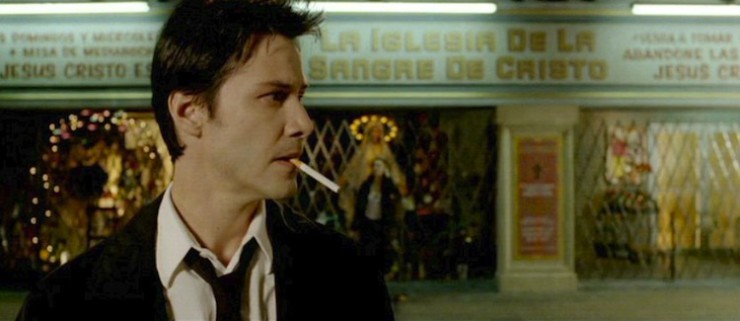
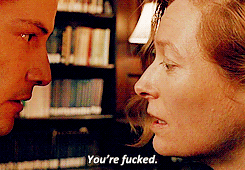
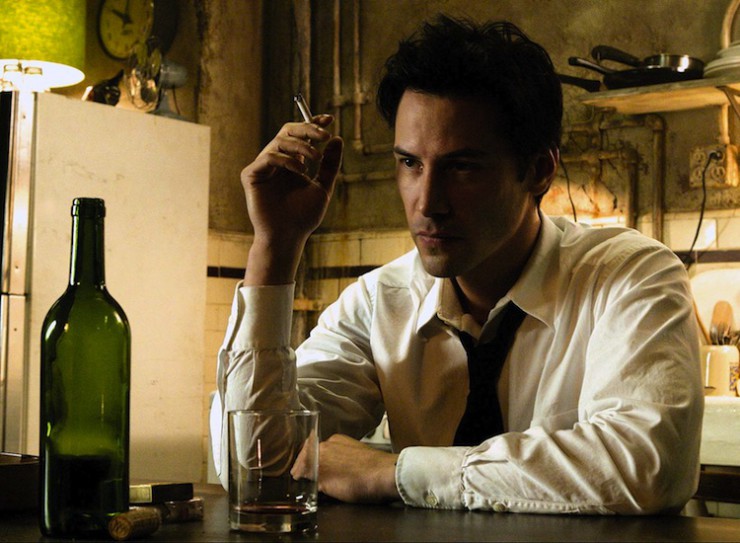
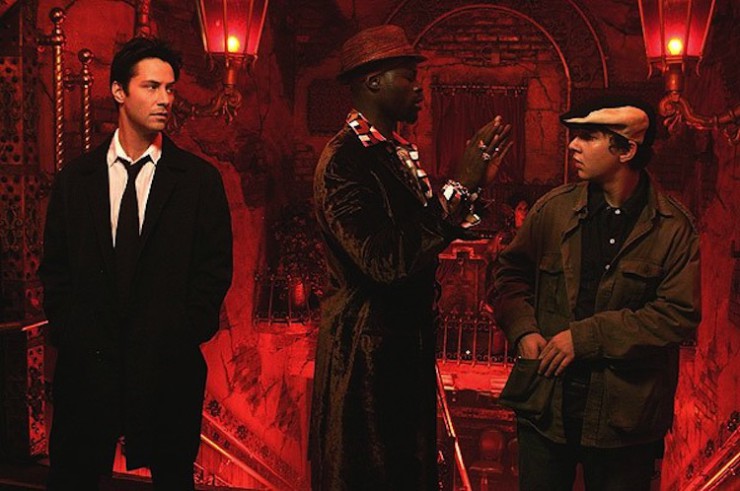
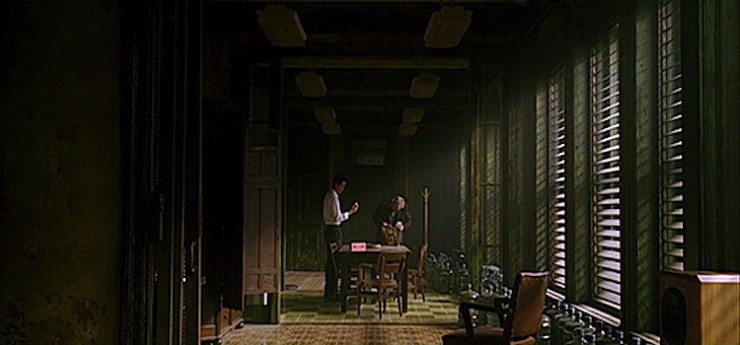
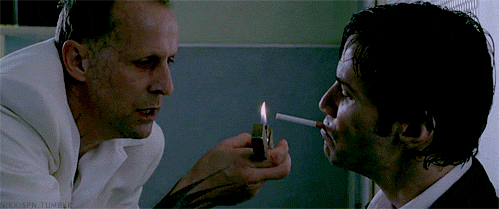
*clap* *clap* *clap clap clap clap clap*
I didn’t realize I’d been waiting for this article, but I guess I have been. You just summed up all the confusing feelings I’ve had about this movie. Bravo. And thank you.
Thank you for this appreciation of a flawed but really fascinating movie. (But Phillip Marlowe was in SF? I thought he was explicitly in LA.)
It’s been a while since I’ve seen this movie, but I would actually argue that Gabriel would be more of the femme fatale. I believe that angels in this continuity are purposely portrayed as androgynous/hermaphroditic (hence the female actor for a traditionally male character), but it still fits. Gabriel still acts as a covert double agent, while presenting himself as an agent of good. He pulls the double-cross at the end and even attempts to kill the ‘dame’, proving that he was pulling the strings from behind the scenes.
(sorry for the default to masculine pronouns, but I think that’s how they refer to Gabriel in the movie, despite being a hermaphrodite)
I have never read the constantine comics, but I do remember that I liked the movie and never knew why people gave it shit.
For those of us that hadn’t read the comics before seeing the movie, it was really great. I was kind of blown away by it at 17, and of course later discovered that it was very much different from the Constantine comics, but it got me interested.
People shit on this movie and Keanu Reeves all the time, but as a piece of cinema divorced of outside elements, it’s a good movie.
This pretty much sums up how I feel about this film as well. I remember how horribly angry I was the first time I saw it. Over the years I’ve learned to separate it from its source material and actually find a lot of enjoyable ideas in it. It’s grown on me quite a bit because of it and I still watch it periodically.
I don’t pretend to be a serious judge of movies, and the only comic book version of John Constantine I’ve read was in Sandman, but if this movie was on tonight I’d watch it. The Catholicism is not as awful as in some movies, and by defining faith as something you can’t have if you know, it creates an interesting seemingly no-win situation for John. Of course, I also think God is ultimately more forgiving than Gabriel assumes, and the clue is in Gabriel’s library chat with John. If he can stop keeping score when he fights evil, and actually begin to make selfless sacrifices, then he can be redeemed. It might be very difficult for him, but it’s not impossible.
@3, That was my thought too.
I was a huge fan of Garth Ennis’ run on Hellblazer and I still really liked the Constantine movie at the time (but I see him as more of a Sam Spade than Philip Marlowe in this movie), except for this version of Chas. I think if you are going to have a young sidekick character for Constantine, then you should see more of his arrogant and over confident side but that never really comes out.
My main disappointment for this movie isn’t the usual stuff about John no longer being much of a trickster or the vision of Hell. It’s more that I think you lose all of the class division from the Ennis run. Maybe that wouldn’t have played as well in the early 2000’s before the last financial crisis. But Constantine’s catch-22 in this movie is a perfect example of what happens when you have top-down morality without equity. But because the movie was relocated to LA, it can’t piggy back on the kind of inherited wealth and position Lordship vibe you get from the Snob in the comics, where he is the perfect embodiment of the Establishment. I have no idea what the proper American equivalent might be.
Editing issue: Midway through, there’s a mention of “Lawrence” as if the reader should already know who that is, but no prior mention of the full name. I had to check IMDb to find out that you meant the film’s director, Francis Lawrence.
@10: It’s now been edited for clarity–thanks.
Solid article. I remember when I saw this movie thinking that it was a solid movie. But it got a lot of flack on one side from Constantine fans, who didn’t think it was constantiney enough, and on the other people who never heard of Constantine, and just saw another bombastic comic related movie that they coudn’t find any purchase in.
I read dangerous habits years before, but it never really struck me as a great story, and was largely forgotten by the time I saw movie. I knew just enough about Constantine, that he did magic, that I wasn’t distracted by all the ways he wasn’t Hellblazer.
I love the Hellblazer comics, and I loved the movie, I though the movie was different, and I dreaded it – american playing John? – but when saw it, it was great, I felt it took enough from the comics and made a new story. Which sometimes is better than filming a frame by frame rendition of a previous storyline.
Sweet zombie Jesus, but I do love this movie. It’s a profoundly stupid movie, true. The plot is ludicrous and I dislike the wrap up with Constantine and Angela. And yet I can’t even guess at how many times I’ve watched it but easily in the hundreds.
The movie is gorgeously shot – the production design alone is fantastic, as are the supernatural effects. And the acting is top notch. Easily my favorite rendition of Christian mythology characters ever. I’m constantly comparing angels and demons to how they were portrayed in CONSTANTINE the movie because Tilda Swinton and Peter Stormare just aced it.
@SM1995: I don’t recall any Marlowe movies or books set in SF. LA was as much of a character in the Raymond Chandler books as Marlowe himself. However THE MALTESE FALCON with Humphrey Bogart as Sam Spade was set in SF, but that’s Dashiell Hammett. But I think Schnelbach’s point still comes through.
Sorry, double post.
Whatever the story is, whatever the adaptation is this is a chef-d’oeuvre of cinematographic art. It is the only movie I know of which keeps the pace from end-to-end. Everything (but Shia) melds in perfectly. Music, light, costumes, scenery, actor-play, everything is perfect. I watch this movie from time to time like I would listen Caravan. Gives me peace.
Thanks Leah.
The headline for this article perfectly sums up my feelings about the movie. It’s a very good movie about a character who bears some similarities to John Constantine, but it’s not about John Constantine, just someone similar with the name. Matt Ryan was much closer to the Constantine of the comics.
But having said that, it’s a very good mystic noir, as Leah ably points out. And Reeves isn’t nearly as bad as everyone feared he’d be in the part.
—Keith R.A. DeCandido
Nice article. I liked the movie without knowing about the comics, and still like it now that I know and watched the show. It would have been interesting if they had left in the demon girlfriend. I don’t think she would have been the femme fatale you were looking for, but she could have brought a conflicted love interest into the movie.
Back in 2005 or 2006 i downloaded this movie (gasp, a pirate!) in the cam version (means someone recorded it with a videocamera in a theater). Very bad quality of image and sound. Somehow that contributed to the ambience of the movie. I enjoyed it and it stayed with me as something above the average in terms of imagery. I guess it makes sense now that i read this.
Hang on now, I liked this movie. It worked. Keanu worked. Granted it was a departure from “Hellblazer”, it fit. When they tried to adapt it to the TV show, they were faithful, but there was something about the acting and casting that didn’t feel good. Keanu worked for the role because he could play an occult guy that is world weary. Shoulda had a sequel.
“Into the light, I command you”.
Woof™.
I don’t read comics, but I enjoyed the movie. I get the impression that non-comic fans are generally far more likely to enjoy film adaptations than fans…
What I love about this film is what causes Lucifer to hate-heal Constantine! Constantine has redeemed himself, starts to Transcend, realises what is happening, and gives Lucifer the finger.
The way that scene is played, the way Peter Stormare plays Lucifer’s transition [from benevolent victory (at finally getting Constantine’s soul), to being aghast bewilderment at this moment being snatched from him as he struggles to understand what is happening, to anger as he realises what is happening, then being pushed into literally incandescent fury at Constantine’s final gesture] is superb.
More, he gives Keanu Reeves a foil against which to sell Constanine’s final moments. The act of taking his own life in order to summon Lucifer is a great plot twist. It is the final desperate act of a man that sees no other way to “win”, even if it’s a pyrrhic victory. Reeves makes this a believable choice.
But then comes the epiphany. The first time he committed suicide (I’m counting it as successful even if the medics brought him back) he was doing it out of pure selfishness. He wanted to escape what he thought of as the hell his life had become; only he then experienced Hell and realised he’d doomed himself. The second time he took his own life (and I’m counting it as Lucifer turned up and he also began to ascend, even if the Morningstar brought him back) he did it completely altruistically. He knew his certain fate and did it anyway, thinking all the time about others. The act that doomed him is the act that ultimately redeemed him.
Truely the end justifies the means.
Reeves sells all of this. The way way enlightenment dawns and brings a kind of serenity is a great counterpoint to Lucifer’s confusion and subsequent anger.
I say “kind of serenity” because the character retains just enough cocksure arrogance to flip the bird to Lucifer. And you don’t face palm because it’s out of character, you facepalm because it *is*, squarely and dead centre, exactly in character for Constantine in the way the movie has set him up. You get the feeling that without that, Lucifer would have wailed impotently in anger at Constantine’s redemption. With that final shove, Lucifer gives Constatine a third chance at life. A third chance to doom himself to heaven or hell. Except this time the odds are stacked in the mortal’s favour. Unlike his first life, he knows what is really going on and what the stakes are. Unlike his second life, he knows he’s going to heaven unless he *really* screws up.
So Lucifer’s going to have to work *really* hard to manoeuvre Constantine into making that mistake in his third life. He doesn’t like to lose, and he may just keep healing Constantine forever than admit defeat and allow him into Heaven.
All of that from a couple of minutes dialogue and two actors delivering those lines in a very minimal set.
You might guess I like that scene.
One of the things I loved about this movie (and another Keanu flick: John Wick) was the inclusion of unexplained elements. What are the tattoos on his arms? How do they work? Do they do anything other than summoning angels? So many other movies would have a 5 minute As You Know dialog to explain them to the audience. Constantine just throws it out at us, and says “Some things don’t have explanations. Deal with it.”
The main problem for this movie, is the title. The title brings with it certain expectations that this movie doesn’t fulfill. Had they named it “Keanu Reeves: Magic detective man” or something like that, then it would have been measured on its own merits. Instead it’s measured against the, in my opinion, infinitely better sourcematerial. It’s not a bad stand-alone movie, just a horrible adaptation.
It’s not exactly unprecedented for an adaptation to take enormous liberties with the source and still be good on its own terms. One such adaptation was recently covered on this site — Who Framed Roger Rabbit? There’s also Frankenstein, Planet of the Apes, Blade Runner (indeed, almost any Philip K. Dick adaptation), Men in Black, The Iron Giant, How to Train Your Dragon, Big Hero 6, the Bill Bixby Incredible Hulk series, etc. Except for Blade Runner, they all used the same name or nearly the same name as their source material. Sure, a name can create expectations, but when it comes to adaptations in general, it’s often best to expect a new interpretation.
One slight problem I have with the script is a misunderstanding of Roman Catholic dogma on the subject of suicide. Yes, a successful suicide qualifies as a one-way ticket to eternal damnation, but only because if it is successful, you die with a mortal sin (murder) on your soul — and since you’re now dead, you cannot confess it, or serve penance, as a living murderer might. Since Constantine’s attempt was not successful (evidenced by his successful resuscitation), he would, by Catholic doctrine, be as free to petition God for his contractually-guaranteed forgiveness-by-confession as anyone else.
I’ve followed John Constantine (rhymes with “wine”, mate), since he debuted during Alan Moore’s classic 1980’s Swamp Thing run – and that familiarity was a barrier to enjoying this film, at first. So far I’ve only seen one episode of the recent TV series, (plus the “Arrow” crossover episode), but I can tell the more recent effort managed (pronunciation issues aside), to capture at least some of the classic Vertigo feel in a way the feature version just doesn’t.
However, my wife, who was relatively unexposed to JC, managed to turn me around on repeat viewings. I now place this film in the same category as the 1990’s American Godzilla, or the more recent “I, Robot” movie, in that it would have a much better reputation if it had another title. Considered on their own merits, each is a solid example of it’s particular genre — But if I go to a Sherlock Holmes movie, I don’t expect to see a story about a hard-bitten Chicago street cop circa 1938. Oh, it might be a damned good period piece/police procedural* but it just ain’t according to Doyle.
*Extend the alliteration at your own risk.
it’s a real pity that there won’t be a sequel to Constantine :( i personally like this film a lot
@26/rocketjay: “…his contractually-guaranteed forgiveness-by-confession…”
I’m not Catholic, but isn’t this also a misunderstanding of Catholic doctrine? I’ve come across articles or discussions where Catholics pointed out that the public tends to misunderstand confession, to think that it’s a simple process where going through the motions and saying a few Hail Marys can earn you automatic absolution, when actually it’s something you have to earn by demonstrating that you genuinely understand the wrongness of your sin. So it’s not “contractually guaranteed” that you’ll get forgiveness simply by confessing. The guarantee is that you have the opportunity to be forgiven, but you have to be sincere and do the work of soul-searching and genuine repentance in order to earn it.
I’ve seen it pointed out that the Devlin/Emmerich Godzilla is essentially a remake of The Beast From 20,000 Fathoms (the film that loosely inspired the original Godzilla). Although I still don’t think it would be much better received under a different title. I’ve long been onboard with the idea that it’s best seen as an independent monster movie about a creature that’s just nicknamed Godzilla as a case of mistaken identity, but I rewatched it not long ago with an open mind, and I realized it was worse than I remembered.
As for Sherlock Holmes, interestingly, nearly every Holmes movie made in the first half of the 20th century was updated to the then-present day, with only three exceptions that I know of (the recently rediscovered 1916 William Gillette silent film and the first two Basil Rathbone films). Yet somehow, everything from 1950 to 2010 treated Holmes strictly as a 19th-century character.
I gather that, in addition to Sherlock and Elementary on TV, there’s a current comic book called Watson and Holmes that reinterprets the duo as streetwise African-American detectives in present-day Harlem. It actually sounds pretty intriguing, from what I’ve read about it, though I haven’t gotten around to reading it.
Heh. The Sherlock Holmes cinematic time frame drift is an interesting quandary in itself. I do recall that when the classic Rathbone/Bruce series was slid forward into the then-contemporary early WWII period, a text screen preceded the film explaining the dramatic logic of the change, namely that the tone of the times (the blitz, etc.) meant that Britain needed their classic hero front and center. Artistically satisfying, if somewhat paradoxical.
The return to the gaslight-era setting from the 1950’s on is probably related to a wave of turn-of-the-century nostalgia present about that time. The current penchant for modern-setting Holmes is intriguing, as they must be set in some kind of parallel world where the literary/cinematic canon doesn’t exist. One wonders what Holmes enthusiasts do with their spare time in such a world–the Rue Morgue Irregulars, perhaps.
@29/rocketjay: But what’s interesting is that the Rathbone films didn’t necessarily need to explain the modern update, because almost every other screen version of Holmes before them had also updated it to the present. Of course, Doyle himself was writing stories well into the late 1920s, so it wasn’t as much of a leap for films released in the ’20s or ’30s to modernize the character; but it was the standard practice prior to 1950. A wave of nostalgia or a generational shift could explain why period-set Holmes adaptations became more common after 1950, but what’s striking is the complete and sudden reversal halfway through the century — almost exclusively modernized adaptations before 1950, and essentially no modernized adaptations after 1950. (There were two very similar TV movie pilots that had Holmes cryogenically frozen, revived in the 1990s, and paired with a female Watson descendant or surrogate, and two very similar animated versions that sent Holmes into the future via time warp or weird-science resurrection; but they all treated Holmes as a native of the Victorian era.) It’s really rather strange that we had a gap of over 60 years before we got another story treating Holmes as a native of modern times — and then got two of them in quick succession. (Although I think I read that there were several earlier attempts to do a modern Holmes series that didn’t pan out for one reason or another.)
Well, I like the movie. It was weird enough to please me. Tilda Swinton’s bit sewed it up for me! LOL
I will forever be an accolade of this movie. Mainly because it was my first approach to the character, but also because I can’t help myself in appreciating Keanu’s chops whenever he gets an interesting character to play with. Also, Tilda Swinton is fantastic in this movie, as is Stormare. And I love this movie’s Special FX, particularly the look in the post-credits scene.
Trivia tidbit: Constantine‘s Spear of Destiny is the same prop used in Hellboy as such.
Great article, though it needs a bit of a spelling check.
I still like the movie. We bought it as a bargain thing from Blockbuster and that was how I first saw it. I rewatched it DOZENS of times. At the time my comic-reading experience consisted of “Tomb Raider” (the old comics), “Witchblade”, a few “X-Men” and “Ultimate Spider-Man” issues and various manga and webcomics. I didn’t know Constantine was even a comics character until around college, when I really dug into Marvel and DC. I get it. I don’t like bad adaptations either. But I’m not against trying for a new story while using an old framework (as long as it’s a GOOD story) and I still like this on its own. One thing I really liked about it was that it really left me hoping for a sequel, which is something I haven’t done in a LONG time in film. There were enough things left unexplained but that felt so right that I wanted to know more (particularly about Midnight – I wanted to know his story). And I still like the parody aspect of how John pulls out, not a cigarette, but a pack of nicorette gum at the end of the film (I mean that’s beautiful). The movie has a lot of elements on making up for mistakes and people who just keep trying in small ways and I really like that. And I don’t mind the non-kiss? I didn’t find their relationship romantic? Just a lot of adrenaline. John was largely self-centered in the film and Angela has had her life over-turned. I liked the non-kiss in “Pacific Rim” and I think it echoes this relationship in a lot of ways – learned mutual respect, not romantic passion. I’m also kind of ambivalent towards LeBeouf’s acting in general, particularly in this film, but I can agree that his relationship with Reeves really doesn’t work. I loved they way they used Swinton to represent the more androgynous aspects of various depictions of angels. If nothing else, it’s a great watch-while-you-workout film.
Ok, for those who didn’t know before Matt Ryan gave fans what they wanted:
John Constantine. Demonologist. Exorcist. Master of the Dark Arts. Trickster. Think Loki, but with more dark magic. And put in some Christian views for good measure. That is John. Drop him in London, and make him a working class man. And you got the Hellblazer series.
Now here is where fans raged. An American, who was not blonde. Who wore all black, and basically looked like John’s first arch enemy Nick Nectro. And he was far and away the trickster that he is in the comics. Thing is, why should every comic adaption follow the comics? If it did, then we wouldn’t need to bother driving to the theatres because we will know 100% what will unfold. This adaption was thought our with the greatest of care. Taking time to not only just show John fight lung cancer, and hell. Not only just show John trick and wit his way out of trouble. It showed how John is capable of doing the unspeakable. And the unforgivable, in order to acheieve success. This film is modern-day noir at it’s finest. It is not the Constantine comic story, but rather an adaptation that carefully took an idea, and made it much more immense in size and mass. It took 1 little note, and made several side notes to work off of. It made John look better in the sense that he is shown to be the Constantine we should see all the time in the Hellblazer comics.
So maybe he was American. Maybe he wasn’t blonde. Maybe he didn’t use tricks or wit. But it does give a rather amazing Constantine story that, as accurately as I know it from, follows the comics close. If not, surpasses it entirely, in terms of story and plot. A film adaption doesn’t need to always follow the comics. It is, at it’s own right, a separate universe. So what if trying to see it as a failed attempt…we see it as a separate cinematic universe like the DCEU and MCU of today?
It really frustrates me that they never kiss, even though there are several moments where they tease it… i hate that… i really really hate that… i wanted to see it happen… dammit
We recently reached this in the great superhero movie rewatch, if folks want to read another take on it. (Though I mostly agree with Leah…………..)
https://www.tor.com/2018/06/01/thats-called-pain-get-used-to-it-constantine/
—Keith R.A. DeCandido
@35 /Maryann- I actually like those scenes. They’re played for laughs, and should be funnier, but they still raise a smile. They also speak to Constantine as a hero. She’s emotionally vulnerable and he could take advantage of her, but he doesn’t.
He’s interested, but doesn’t pursue it in the film. Is it because he knows he’s dying? Is it because he’s destined for hell, and doesn’t want to compromise her? Is he trying to be good, to avoid hell? Does he think she’s to good for him? Is he, despite his protests, a good man refusing to take advantage? Does he not want the distraction as they’re trying to save the world? To draw a little from Reeves movie Speed, does he know relationships formed this way don’t last, and he wants to see how things go when the fate of the world doesn’t weigh on their actions? Or is it a little bit of everything?